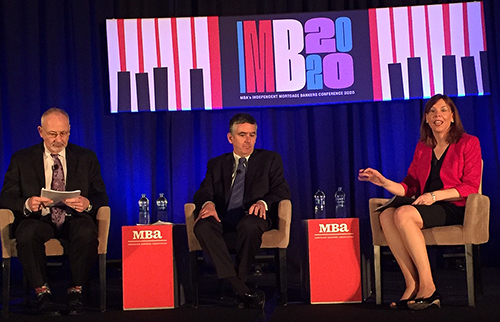
#MBAIMB20: Mortgage Market Outlook for IMBs

NEW ORLEANS—Last year at the Mortgage Bankers Association’s Independent Mortgage Bankers Conference, the outlook for the economy and IMBs seemed a bit bleaker.
“We thought we were going to be chased off the stage,” quipped MBA Vice President of Industry Analysis Marina Walsh.
“What a difference a year makes,” said Bill Lowman, President and CEO of American Pacific Mortgage Corp., and indeed, the housing market appeared to recover somewhat, thanks to a number of factors—not the least, interest rates falling below 4 percent again, sparking another wave in refinancings.
“2019 was an extraordinary year,” said MBA Chief Economist Mike Fratantoni. “But we don’t expect that to continue. We think the refi wave will continue through the first half of the year, then drop off sharply. Meanwhile, low interest is driving home demand and increases in home prices.”

The 2020 MBA economic forecast calls for slowing economic growth in 2020 and some weakening in the job market. He noted recent problems experience by Boeing over its 737-MAX aircraft could have as much as a half-point impact on U.S. gross domestic product. And the coronavirus pandemic could have a catastrophic effect on both the Chinese and the world economy. “China represents 16 percent of the world economy,” Fratantoni said. “
He added that the previously predicted steady increase in the federal funds rate is now off the table, with the Federal Reserve expected to raise interest rates only marginally through 2022.
But mortgage interest rates could drop even more in the short-term, Fratantoni added, which should be good for home buyers. “For the first time, post-crisis, we are seeing a real increase in the pace of home building,” he said. “We expect growth on the new side, growth on the existing side, which lines up well with job growth and wage growth.”
Although refinances are expected to tail off, Fratantoni said the purchase market is poised for strong growth for at least the next several years. “The homeownership rate is back above 65 percent, and the level of household formation, particularly among younger people, is growing,” he said. “This wave of people and households is going to support the purchase market for at least the next three or four years.”
The headwind, Fratantoni said, lies in existing homes, noting the mobility rate of the U.S. population has fallen to less than 10 percent. “That’s an enormous rate of change from even just a few years ago,” he said. “It’s putting a damper on existing home sales.”
Walsh noted independent mortgage bank profits have been strong as of late, and are expected to continue. “We don’t forecast profitability, but the next couple of quarters are looking strong,” she said.
This recent increase in IMB profits compares favorability to even just a couple of years ago, when IMBs reported few profits, or even losses. “And IMBs have a hard time surviving if they can’t make money,” Walsh said.
One thing IMBs have been doing to combat that is by cutting costs, Walsh said, noting IMBs have effectively cut more than $1,500 in loan expenses over the past two years and are poised to cut as much as $500 more.
So, is technology paying off in cutting costs? Are banks’ substantial investments in technology resulting in substantial cost reductions? Walsh said the jury remains out.
“We just haven’t seen the improvement yet,” Walsh said, noting that data might still be too new to effectively evaluate. “We’re still waiting to see this change in productivity.”
Lowman observed the overall market has become more competitive for IMBs, as brokers have begun siphoning off business. He said his company lost one branch last year when the staff converted to a brokership, although several of them eventually returned to the company. “The ‘banker to broker’ phenomenon is now becoming the ‘banker to broker back to banker’ phenomenon,” he said.
Fratantoni said MBA data show IMBs are “opportunistically” retaining more servicing, particularly as larger banks have backed away from servicing.
